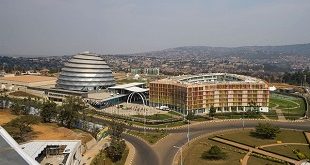As Museveni once said, praising one African country as performing better than others is like discussing who is taller among dwarfs. Governments have come to power by different means: elections, military coups, death of incumbents, popular insurrections, foreign invasions, protracted armed struggle and/or retirement of some presidents. The leaders have also been of different stripes – nationalist leaders of independence struggles, military upstarts, democratic populists, conservatives, radicals, capitalists, socialists, revolutionary guerrillas, young and old etc. Yet both the governance strategies they have employed and the developmental outcomes they have registered remain stubbornly similar with variations only in degree or detail but not in substance.
So, as I read Museveni’s book, I got the sense that he genuinely believed that Uganda (and Africa) had the capacity to rapidly transform at the same pace and scale of Singapore and South Korea but had only been frustrated by bad leadership. It is a belief deeply embedded in the mind of most African elites I talk to. Now 35 years later, I wondered what he thinks. Our country has registered tremendous progress over the last 35 years. But it is not on the scale of what we saw in East Asia in the 1960s, 70s and 80s. And neither is it anywhere comparable to the pace and scale of structural transformation we are witnessing in China today and in countries like Vietnam.
Hence, in 2021 Uganda is the actual prototype of a neocolonial state. The commanding heights of our economy – banking, manufacturing, telecommunications, mining, large infrastructure construction firms, etc. – are largely owned by foreigners. We still produce and export raw materials or semi processed goods which fetch little value in global markets. No African country has developed a brand anywhere near Hyundai, Kia, LG and Samsung. Even in what I consider to be Africa’s best managed country, Rwanda, I do not see transformative change on the pace and scale of Singapore or China – it remains a well-managed poor country.
The lesson from Museveni’s book and record is that his diagnosis of Africa’s problem, like that of so many others, was fundamentally flawed. He grossly misunderstood Africa’s core problem. He ignored the structurally obdurate factors – domestic and international – that can neither be wished away nor changed easily. Like many before him, he focused on the smaller part of the problem – political leaders. He was unable to see that leaders are products of the societies they govern; how they govern is greatly shaped by their circumstances, much more than their personalities.
Indeed, I would even go further to argue that the main lesson from Museveni’s book and his record in government is that actually, leaders do not really matter. Ok, that is an exaggeration on my part, but I exaggerate only to stress a point i.e. that they matter only marginally. Their decisions are rarely stupid. Rather they are a response to reality. Within narrow margins, their political decisions can make a difference. But in a fundamental sense no leader of Burundi or Chad, however brilliant, can turn it into a global power. Intellectuals in Africa need to begin studying the broad impersonal forces that constrain our nations and our leaders – and even our societies broadly – and compel them to act the ways they do.
****
amwenda@independent.co.ug
 The Independent Uganda: You get the Truth we Pay the Price
The Independent Uganda: You get the Truth we Pay the Price




Andrew Mwenda, you are right when you say M7 has no difference from his predecessors in running the affairs of Uganda. Corruption, extrajudicial killings, repression of the opposition, human rights violations, election rigging, etc. are the order of the day in the tour of this regime. I think there is no way the regime can escape most of the enumerated facts if only Ugandan and Huma Right Watchdogs come up with strong evidence to ICC.
Now do we also hjv justifiable reasons to go to the bush ..
But Andrew, how does being “more skillful” in the game of wrongdoing make Gen Tibuhaburwa better than his predecessors, whom he demonized as swine? In other words, how less a swine is Mr. Museveni?
Mr. Museveni’s swiness is worse than his predecessors because, over 35 years and counting, the number of casualties (social economic and political victims, vis-a-vis human rights violations) under Gen Tibuhaburwa’s barbarism is unimaginable.
It is great to resurrect some thoughts from antiquity. Am certain that is one of the many thoughts that gather dust on book shelves. The Green Book of Muamar Gaddafi and the Juche Idea of Kim il Sung fall under such modern antiques but as you can attest it was empty double talk. The pupportd authors came out inept when the highest responsibility of their fellow countrymen fell on their shouldes. Ironically most thinking about the African problem, intentionally utilizes examples that faiil to put the problem in proper context. It would make sense if we compare African countries with each other. In Uganda we would well compare with South Sudan or.Malawi. India or Pakistan or Singapore will distort the picture due to their respective sizes.
All I can say is that publishers of such books will find it hard to make a sale.
As Mwenda revisits past writing, he’s soon revisiting familiar walls of prison.
😀😀 surely
1.The Tiger Nations developed because of favorable legal reforms in Commerce and Trade .So what is Africa ‘s Problem;she is still not confident in her own skin when it comes to making key Economic Reforms.
2.Its of late that the supersonic global changes in Trade and Economics has opened the eyes of Ugandans/Africans they are now fed up of being a laughing stock.
3. To me;Procurement is just about fraud i actually dont know why there is a whole programme called Bachelor of Procurement offered in some Universities.I cried and cried and cried when the President requested the COIVD team to directly contact Toyota in Japan when purchasing the vehicles they needed than relying on middlemen can you imagine the middlemen quoted 3 time the market price?Just imagine how much Ugandans have lost through procurement procedures.
4.Why was the World Bank and other International Donor Partners against Uganda giving contracts to the Army?Its because Ugandans have realized that there is no big difference in the services they offer .
5,Africa is still a Trade Virgin she is the girl to watch on the Trade Broadway.
But Winnie, the more the law a country has the more corrupt it becomes. In other words, more laws more outlaws to deal with; and the hellish court backlog and overflowing jail that goes with it.
And Winnie think of it: in 1986. while Singapore was launching its City Subway mass conveyor public transport, Ugandans were going backward: introducing Boda-boda, abominably murdering each other on their streets and bushes, abducting each other chest thumping, promoting and awarding each other bloody hero medals.
That’s the problem of Africa: for decades being led by self-confessed authors and masters of violence, whose ascend to power and wealth are ends in themselves, but not national interest. For example look at what is happening in Sudan is embarrassing for the continent, especially for countries that are already on the path of democracy.
I agree and disagree with Museveni. I will not say why I agree with him, but will say why I disagree with him. As you rightly put it, nearly all African countries have that problem. Different leaders have ruled our countries, but the results have always been the same. This suggests that there is a bigger and deeper problem than the problem of leadership in Africa.
Let me give an example. We always say we’re poor because our (different) leaders are bad. I’ve often argued that the (different) leaders come from among us, who are not any better either. In other words,we can’t expect our leaders to be much different from us if they’re from among us. Most of the leaders in most developed countries are different because they come from different societies. If we substituted the Germans for us Africans in this continent, Africa would develop faster and would be completely different. So, unless we diagnose the bigger and deeper problem and address it, Africa will always be the way it is today or was yesterday.
Asante
Thanks, Andrew. You have merely criticised M7’s understanding of Africa’s problem. I hope in your next article, you will discuss what Africa’s problems really are.